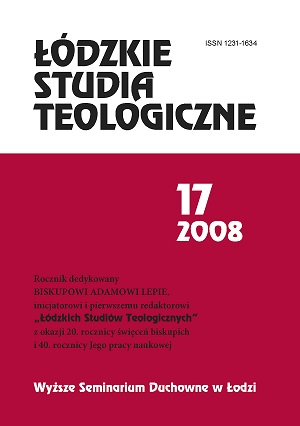Przypadek moralnie dobrego ateisty – racjonalność interpretacji religijnej w kontekście empirycznego modelu uprawiania nauk społecznych
A case of a morally good atheist – reasonable religious interpretation in the context of empiric model of research in social sciences
Author(s): Bronisław GrulkowskiSubject(s): Ethics / Practical Philosophy, Social Philosophy, Philosophy of Religion, Sociology of Religion
Published by: Wyższe Seminarium Duchowne w Łodzi
Keywords: faith and practice; social teaching of the Church;
Summary/Abstract: The following article attempts to justify the rationality of religious explications in the context of a paradigm of empirical studies which is widely used nowadays. The Author refers to the opinion of John Paul II on specific mentality of contemporary generations open to empiria and rational arguments. This reference reinforces the assumptions made. To illustrate the problem and bring it into the context of everyday practice, the Author presents an example of a morally good atheist, who is convinced that he owes his own virtue to himself only, excluding – a priori – God’s work. The Author comes to a solution by a comparison of two interpretations: an atheist one – in its concept, closed to non-empiric world and religious one – open to both empiric and non-empiric (supernatural) dimension.
Journal: Łódzkie Studia Teologiczne
- Issue Year: 17/2008
- Issue No: 1
- Page Range: 213-228
- Page Count: 16
- Language: Polish

